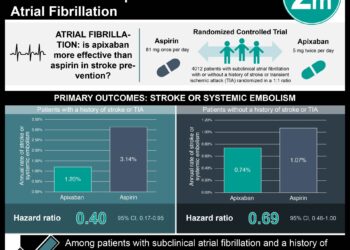Aspirin therapy linked to fewer cases of preeclampsia
1. Aspirin therapy for high-risk women was associated with a lower prevalence of preeclampsia.
2. In women with preeclampsia, aspirin therapy was linked with a lower likelihood of early delivery.
Evidence Rating Level: 2 (Good)
Study Rundown: Preeclampsia, characterized by high blood pressures after 20 weeks of pregnancy, can occur in women with normal baseline blood pressures. If untreated, adverse outcomes can include serious maternal and fetal morbidity, including fetal growth restriction, preterm birth, placental abruption, maternal seizures, and even death. Antihypertensive medications can sometimes be used to lower blood pressure, but ultimately, the only treatment is delivery. Low-dose aspirin therapy has been studied as a potential intervention and results demonstrated promise. While a number of RCTs highlight little to no benefit, new meta-analyses suggest that treatment early in gestation (<16 weeks) may reduce the incidence of early-onset preeclampsia. A number of international agencies, including the WHO, now recommend that women at high risk for preeclampsia be offered aspirin treatment. In a previous study, Hyett et al developed and validated an algorithm to predict the risk for developing early preeclampsia using a combination of maternal demographic, biophysical and biochemical parameters. In the present study, the same was used algorithm to identify women at high risk for preeclampsia and determine the impact of early aspirin therapy on the likelihood and severity of preeclampsia.
High-risk women who were given 150 mg aspirin daily starting in their first trimester were less likely to develop preeclampsia. Of those who developed preeclampsia, women who received aspirin therapy were less likely to deliver early. Strengths of this study included screening patients for risk factors early, so they could begin aspirin therapy in the first trimester rather than waiting for 16-22 weeks. Limitations included retrospective design, significant differences in baseline characteristics (e.g. more young and East Asian women in the intervention cohort). A lower baseline risk of preeclampsia among younger and Asian women may underestimate benefit of aspirin therapy and bias results toward null. Additionally, the study was underwpowered to assess adverse outcomes associated with aspirin use (e.g. increase in peripartum bleeding events). Larger randomized controlled trials of aspirin therapy in high-risk women starting in the first trimester are warranted to further support these findings.
Click to read the study in Ultrasound in Obstetrics & Gynecology
Relevant Reading: Prevention of Preeclampsia and Intrauterine Growth Restriction With Aspirin Started in Early Pregnancy: A Meta-Analysis
In-Depth [retrospective cohort study]: Researchers screened 2 consecutive cohorts of pregnant women for risk of early preeclampsia 11-14 weeks gestation. The first cohort (n = 3066) was used to validate a previously developed algorithm—no treatment was given. Women in the second cohort (n = 2717) deemed at-risk (n = 264, 9.9%) were offered a treatment of 150 mg Aspirin nightly. The primary outcomes were prevalence of early preeclampsia and, in those who developed preeclampsia, the proportion delivering early (34-37 weeks gestation).
Fewer women in the aspirin treatment cohort developed early preeclampsia compared to those in the control group (0.04% vs. 0.4%, p < 0.01). Among women who developed preeclampsia, those delivered preterm (before 37 weeks gestation), were more likely to be in the observational cohort than the treatment cohort (0.83% vs. 0.37%, p = 0.03).
Image: CC/Wiki/Tagarcia3
©2015 2 Minute Medicine, Inc. All rights reserved. No works may be reproduced without expressed written consent from 2 Minute Medicine, Inc. Inquire about licensing here. No article should be construed as medical advice and is not intended as such by the authors or by 2 Minute Medicine, Inc.






